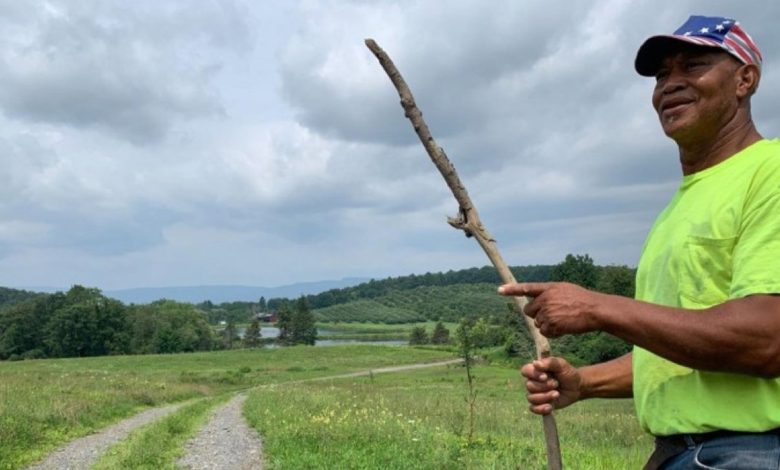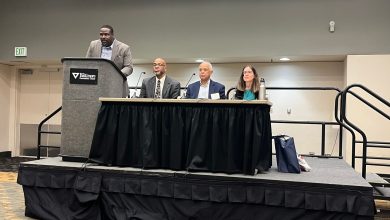For Black farmers like David Haugton, USDA cuts threaten small farmers and local food programs amid policy shifts

In March, the U.S. Department of Agriculture (USDA) made a pivotal decision to terminate the Local Food Purchase Assistance (LFPA) Cooperative Agreement Program, a move that has sent ripples across the farming and food assistance communities nationwide. This program had been critical in aiding farmers, particularly small and minority farmers, by enabling them to sell produce to local food banks and hunger-relief organizations.
New York farmer David Haughton is among those who have been profoundly affected by these funding cuts.
Having faced substantial revenue challenges exacerbated by the COVID-19 pandemic, Haughton had relied heavily on LFPA to sustain his 35-acre farm, which he has cultivated since 1995. The termination resulted in a staggering 60 percent market loss for his farm, jeopardizing his ability to meet mortgage payments and maintain his livelihood.
Initially established in 2021 under the Biden administration as a pandemic response initiative, the LFPA program was designed to support farmers and enhance food security in vulnerable communities. It funneled state funds toward purchasing locally grown produce for distribution through schools, food banks, and other community programs. The end of this program severed crucial revenue streams for farmers like Haughton and the organizations that served as his customers, such as The Campaign Against Hunger and GrowNYC. The consequences of USDA’s cuts have been broad and severe; they accompany the discontinuation of other federal food aid programs like the Local Food for Schools program, cutting over $1 billion annually from these crucial local food supply chains.
The austerity measures form part of a larger USDA agenda under President Trump’s administration, which has focused on reducing federal spending by rolling back support for numerous agricultural and food assistance initiatives. Beyond LFPA, this has included the defunding of the Regional Food Business Centers program, which had been a lifeline for small and mid-sized agricultural enterprises, compounding the financial strain on family farmers amid ongoing climate and market pressures. Critics argue these cutbacks undermine commitments to small farmers while disproportionately affecting minority and Black farmers who historically struggle to access capital and resources.
In response to these cuts, advocacy groups and state leaders have taken action. Senator Kirsten Gillibrand (D-N.Y.), together with 30 other senators, publicly urged the USDA to reverse the sweeping program cancellations, highlighting the threat these actions pose to food security and small-scale agriculture. Several states have also pushed back, with Pennsylvania filing a federal lawsuit against the USDA, challenging the legality of the funding termination, and California’s governor appealing to restore critical LFPA subsidies that had supported the state’s food banks and farming communities with millions of dollars.
Amid this volatile landscape, support organizations like the Black Farmer Fund (BFF) have stepped in to fill the gaps left by federal withdrawals. BFF, created by farmer activists to support Black farmers through low-interest loans, grants, and business assistance, provided Haughton with a crucial grant that helped him save his farm and home. Myra Marcellin, BFF’s investment director, emphasized that access to capital remains the greatest barrier to sustainability for Black farmers, especially after these government funding disruptions. The grant not only helped Haughton stay afloat but also enabled him to invest in new equipment and hire part-time workers, vital steps toward rebuilding resilience.
Tragically, Haughton’s resilience was tested further when a fire devastated his home in August 2025, destroying parts of the house and his supplies. Despite these hardships, Haughton’s dedication remains steadfast. He views farmers not just as producers of food but as essential contributors to society who deserve better recognition and support from both financial institutions and the federal government. His story illustrates the real-world impact of policy decisions on small farmers striving to navigate a challenging agricultural economy while feeding their communities.
The termination of LFPA and related local food programs marks a critical juncture for U.S. agriculture and food security. As federal funding contracts are at risk, the survival of small and minority farmers hangs in the balance, prompting urgent calls for policy reconsideration and continued grassroots support to sustain these vital contributors to the nation’s food system.




